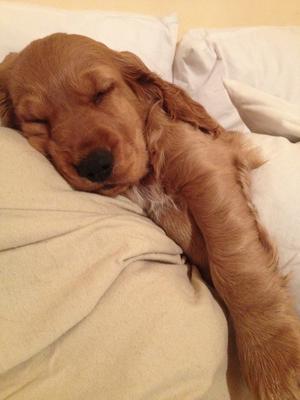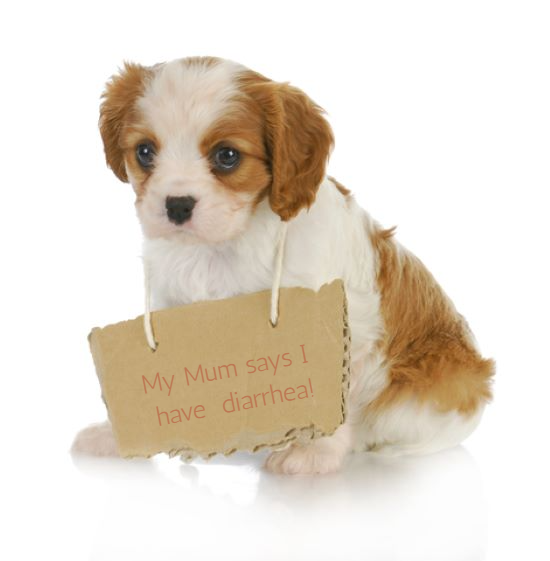- Home
- Cocker Spaniel Puppy Care
- My puppy has diarrhea
My Puppy Has Diarrhea. How Can I Keep Him Safe?
My puppy has diarrhea, and I don't know what to do! I hear this often. Puppy diarrhea isn't always serious, but it can be life-threatening when it is. If your puppy has a bout of diarrhoea it's important not to ignore it.
Understand the difference between diarrhea that's serious (and needs the immediate attention of your vet) and when it's not so serious (and which can be treated by you).
Find all you need to know about puppy diarrhea and how to keep your new puppy safe and healthy!
Diarrhea in Puppies
You'll soon know about it if your puppy has diarrhea, especially if he's not yet fully house-trained!
More often than not, there's usually nothing to worry about, and your puppy will soon be back to normal in a day or two. However, understanding what may have caused your puppy's diarrhea is essential as it will help you know when you can safely monitor your puppy's condition and when you must act immediately.
 Codi, the Cocker Spaniel puppy has diarrhea.
Codi, the Cocker Spaniel puppy has diarrhea.If your puppy has diarrhea, the best advice I can give is this, don't ignore it and hope it will go away. Monitor your pup's behaviour and look for other symptoms, such as lethargy or vomiting.
If your puppy's diarrhea continues for over 24 hours and you think he's behaving differently or seems poorly, you must take him to see his vet immediately. Don't hang about!
When My Puppy Has Diarrhea How Do I Know When It Is Serious?
If your puppy has diarrhea, more often than not, it's unlikely to be a serious issue; however, it's not my call.
You should consult your vet if your pup's diarrhea lasts longer than 24 hours. At the very least, call him and describe your pup's symptoms to allow him to decide whether or not a visit is necessary.
If your puppy has diarrhea and shows any of the symptoms in the following list, you should take them seriously;
- your puppy's diarrhea shows traces of blood,
- your puppy is vomiting,
- he seems to be in pain, or his tummy is tender,
- his poop is very dark,
- he has a fever,
- little or no appetite,
- his gums are pale.
Please don't wait for all these symptoms to present themselves; a puppy with diarrhea and any of these reasons is enough for you to take your puppy to the vet.
 My Mum says I have diarrhea! My tummy hurts!
My Mum says I have diarrhea! My tummy hurts!My Puppy Has Diarrhea: What Are The Causes of Puppy Diarrhea?
Many things can cause diarrhea in dogs and puppies, and thankfully most outbreaks are nothing to worry about; they usually clear up on their own within 24-48 hours.
Here are the most common reasons for cases of your puppy's loose stools.
You've Changed Your Puppy's Diet Recently
Changing your puppy's diet is often a cause of puppy diarrhea so make sure you have a supply of food that the breeder used (and to which your puppy's delicate little tummy can already manage to digest without issue).
If you decide to change to another brand, it's best to do it gradually; decrease the old and gradually replace it with the new puppy food. Otherwise, you risk upsetting your puppy's digestive system. (It should take around three weeks.)
My Puppy Has Diarrhea Caused By Stress? Is This Possible?
Yes, there is such a thing as puppy stress, and it can cause diarrhea!
It can be brought on by a change of environment, for example moving to his new home. Just think about it. Your puppy has left his mother, brothers and sisters and now finds himself in a strange environment where every sight, sound and smell is different.
A situation like this is certainly enough to add stress to OUR lives; imagine what it can do to a little puppy!
Stress can also weaken your puppy's immune system. If stress is the cause of your puppy's diarrhea, hopefully, it will be better in a day or two when he begins to settle down in his new home.
 My puppy has diarrhea but he's okay.
My puppy has diarrhea but he's okay.My Puppy Has Diarrhea. Could Worms or Parasites Cause Diarrhea?
Yes! Did you know that puppies are often born with worms? Not so cute now, are they?
If the mother has picked up roundworm eggs, she can pass the worms onto her puppies before they're born. As soon as the pups are born and begin feeding, she can then go on to re-infect her puppies through her milk.
Another cause of your puppy's diarrhea could be Coccidia, a disease caused by tiny parasites that can affect stressed or sick puppies.
These parasites are often present in most dogs, and a healthy immune system usually keeps them in check.
If Coccidia caused your puppy's diarrhea, his poop would be very watery, and there may be signs of blood and mucus.
If you have a pet with Coccidia, you should know it is very contagious and quickly passed on to other pets.
The moral of this tale is always to worm your dogs and puppies.
Your Puppy Has Eaten Something He Shouldn't Have!
Puppies are inquisitive and use their mouths to explore whatever they come across; anything they can fit into their mouths is fair game!
Unfortunately, this often leads to eating things they shouldn't, such as rotting food, poisonous plants, socks, TV remotes, cat litter, and even cat or dog poop!
You can help keep your puppy safe by ensuring your home is puppy-proof and that all items of temptation are out of reach.
A food allergy or an intolerance to certain ingredients in your pup's food, and rich fatty food, can also cause your dog or puppy to have diarrhea.
Your Puppy May Have An Infection Or An Illness
Puppies are susceptible to illnesses and infections until they build up their immune system and have had all their vaccinations.
Bacterial infections, such as Salmonella or E. coli, will attack young digestive systems and cause severe diarrhoea in puppies.
Viral infections, such as Parvovirus, are another cause of puppy diarrhea. Parvovirus is very dangerous. It's highly contagious (picked up from other infected dog poop), and if not recognized and treated by a vet, it can kill quickly.
These infections are the reason your pup needs to be vaccinated and kept away from public places until your vet gives the all-clear.
If your puppy has diarrhea and isn't fully vaccinated, I recommend taking him to the vet immediately. Don't try any home remedies; get him to his vet.
Puppy Diarrhea Treatment for Mild Cases In Puppies
Where his diarrhea is mild, and your puppy is still lively and curious, it's probably safe to treat it at home; however, if you're worried, don't hesitate to call your vet for advice.
Keep Your Puppy Safe; Keep Him Hydrated!
If your puppy has diarrhea, it may cause him to become dehydrated.
Important Note: If your puppy is less than 4 months old, I don't recommend withholding his food. Instead, stop his kibble and feed him with boiled rice and poached chicken breast. If your puppy's diarrhea continues to improve, it's looking positive! You can begin his kibble over the following few days.
If you don't see an improvement within 24 hours, play it safe and take him to his vet.
Puppies can become dangerously dehydrated within 24 hours, so it's essential to encourage them to drink water regularly.
If your puppy has diarrhea, ensure he has plenty of fresh, clean water daily and encourage your puppy to drink water every hour or so, if you can.
Stop Feeding Your Puppy!
For a mild case of puppy diarrhea, you can starve him for 24 hours, but be sure to watch him for signs of illness or signs that his diarrhea is getting worse.
If you don't like the idea of withholding your puppy's food, you could feed him a bland diet of chopped cooked chicken breast with plain boiled white rice or add some scrambled egg to a couple of tablespoons of boiled rice. Don't use salt in his food.
White fish or boiled, chopped eggs are good alternatives to chicken.
Another alternative is a little chicken stock (you could make your own, or if time is tight, a good quality stock cube is okay) and some cubed cooked sweet potato.
Take it slowly. Give your puppy's little tummy time to settle and recover and encourage your puppy to drink lots of water.
When your puppy returns to normal, you can gradually replace the protein with his usual kibble over the next few days.
Make sure he continues to drink lots of clean water.
If your puppy's diarrhea persists, scoop up a stool sample and take him to his vet.
Make Your Puppy A Cup Of Tea!
Chamomile won't necessarily stop puppy diarrhea, but it will have an anti-spasmodic and calming effect on your puppy's digestive system, which will help his little tummy to settle down.
Place 3 to 4 chamomile teabags in a mug of boiling water. Let it stew, and then allow it to cool. Feed your puppy one tablespoon of this cooled mixture every couple of hours.
Adding a teaspoon of powdered slippery elm to the tea mixture will help combat diarrhea.
Keep the tea in the fridge and give your puppy one tablespoon three times daily.
Before my research, I'd never heard of slippery elm powder, but apparently, it's an anti-inflammatory, an excellent source of fibre, and an ideal food supplement.
It's good for diarrhea AND constipation and everything else in the digestion world. If you're curious, you can read more about it here: Slippery Elm for Pets.
Summary: My Puppy Has Diarrhea!
Where your pup's diarrhea is relatively mild, and he's still his usual mischievous, playful self, it's safe to stop his food and give him only water.
Restricting his food will help clean him out and rid him of whatever nasties are causing his diarrhea. He must drink plenty of clean water to replenish all the liquid his body is losing; I can't emphasise this enough!
Never attempt to diagnose the cause of your puppy's diarrhea, or treat it yourself in puppies younger than 7 or 8 weeks old. You must consult your vet immediately.
Where puppy diarrhea lasts more than 24 to 48 hours, and none of the above is helping, a trip to the vet is strongly recommended.
Remember, if your puppy shows signs of lethargy, loss of appetite, sickness, or seems generally unwell, don't try to treat it yourself. Just get your cocker spaniel to the vet as soon as possible.
Photo Credit: My Puppy Has Diarrhea
1. Codi - Naydia our loyal visitor form Cape Town, South Africa
2. WilleeCole at Dreamstime https://www.dreamstime.com/royalty-free-stock-photography-puppy-message-image23302737
3. Visitor photo. This is Aroha, my first cocker spaniel puppy!





